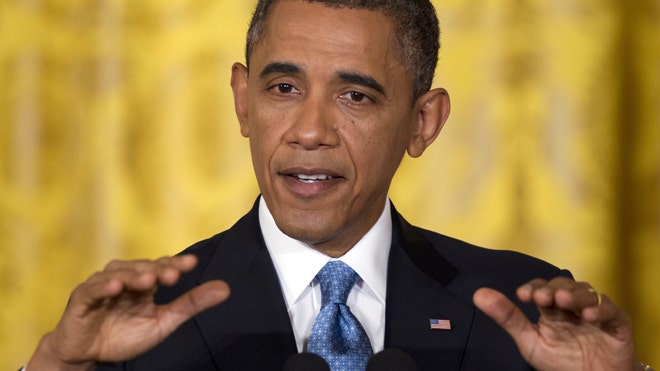 |
| President Barack Obama speaks during his final news conference of his first term. (AP) |
Democratic officials familiar with the plan said Thursday the tax-exempt organization will be called Organizing for Action and seek to harness the energy of the president's re-election campaign for future legislative fights. Officials said the group will be separate from the Democratic National Committee and advocate on key policy issues such as gun control and immigration, train future leaders and devote attention to local issues around the nation.
The president's 2012 campaign manager, Jim Messina, will serve as the group's national chairman, and White House official Jon Carson is leaving the administration to become its executive director. The officials said the organization plans to accept donations from individuals and corporations -- and disclose their identities -- but not take money from lobbyists and political action committees, a move in line with donor rules set up for the president's Inaugural Committee. It will have offices in Washington and Chicago, the officials said.
The officials spoke on condition of anonymity because they were not authorized to discuss the plans ahead of an announcement on Friday.
Coming just days before Obama's second inauguration, the move represents the first time a sitting president has ever transformed his presidential campaign operation into an outside group with the express purpose of promoting his agenda.
Obama campaign aides and volunteers are expected to discuss the group at a conference on Sunday focused on the future of the campaign organization and the president's legacy.
The new Obama group was first reported Thursday by the Los Angeles Times.
The group's board of directors will include several former White House and campaign aides, including former White House press secretary Robert Gibbs, top campaign officials Stephanie Cutter, Jennifer O'Malley-Dillon and Julianna Smoot, and Frank White, a businessman and prominent Obama donor.
White House aide David Plouffe, the 2008 campaign manager, is expected to join the board after he leaves the administration later this month. Obama campaign senior adviser David Axelrod will serve as a consultant to it.
Obama's political apparatus, which paired traditional grassroots techniques with cutting-edge technology to fundamentally change the electorate, was groundbreaking when it was created for the 2008 campaign. It signed up legions of backers, collected information about them and linked them to each other through the Internet. It also used sophisticated new tools -- and mounds of data it had culled -- to identify sporadic or new voters, and ensure they turned out on Election Day.
Huge numbers of minority, young and first-time voters went to the polls to carry Obama to victory.
After he won, Obama decided to house the backbone of his campaign -- his massive email list, which at the time included roughly 12 million to 13 million contacts, its technological functions and its network of neighborhood team leaders -- at the DNC, which historically has served as the president's political arm.
The grass-roots mobilizing and fundraising operation was dubbed Organizing for America, and it sought to marshal support for Obama's health care overhaul during the first term. But it struggled to have much impact on the divisive debate and essentially became a campaign-in-waiting for Obama ahead of his re-election race.
When Obama launched his 2012 campaign, he had a full-scale political operation at the ready. It raised more than $1 billion and used high-tech tools to identify supporters and turn them out in droves. He also used it to mobilize grassroots supporters behind efforts to extend the payroll tax cut, federal student aid benefits and recent efforts to raise taxes on the wealthy.
Since Obama's re-election, one question in Democratic circles has been whether Obama would turn over his operation to the DNC to build the party for the future -- or whether he would use it to protect his legacy.
After surveying its members, Obama's re-election campaign team considered housing the organization within the DNC but decided to become a nonprofit because it was the best way for campaign volunteers to stay together as a group and advocate for issues they care about.
Yet the decision to be separate from the DNC could rile some Democrats who have grumbled that the president was more interested in protecting his own "brand," in political speak, than in building the party.
The group will be a 501 (c) (4) under the federal tax code, which grants tax-exempt status as long as organizations are not primarily involved in activity that could influence an election. As a nonprofit, it could run ads advocating support for an issue but could not be involved in political activity aimed at electing Democratic candidates.
Campaign finance experts said the creation of a nonprofit group with close ties to the president could raise questions on how donations from corporations might influence federal policy. Craig Holman, who lobbies on ethics and campaign finance for the watchdog group Public Citizen, said if the group receives corporate and special interest money, it could "pose some very serious problems."
The decision by the group to accept corporate donations also reflects Obama's shifting stance on campaign finance. He criticized pay-for-access activities during his first campaign and was a vocal opponent of "super" political action committees, which can raise and spend unlimited funds to help candidates. Obama later signed off on Democrats creating super PACs when he faced tens of millions in spending by allies of his Republican campaign challengers.
source: fox news
No comments:
Post a Comment